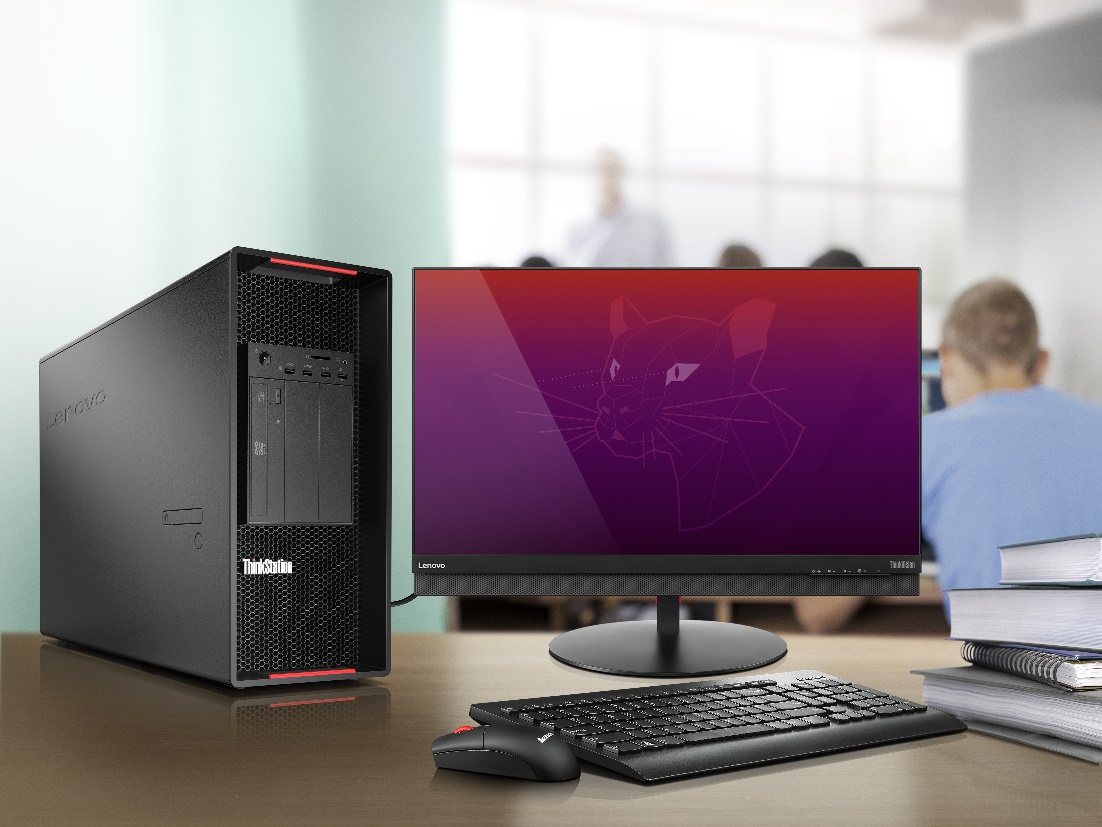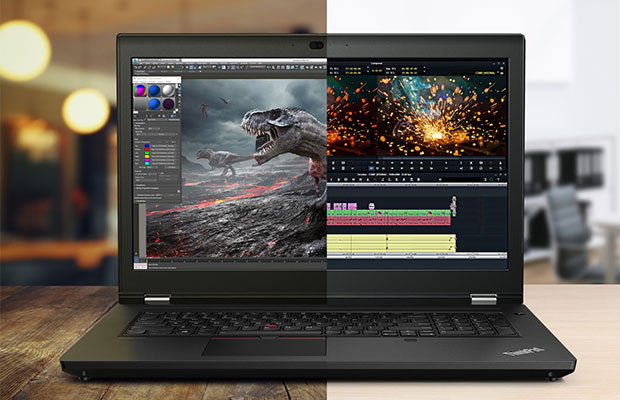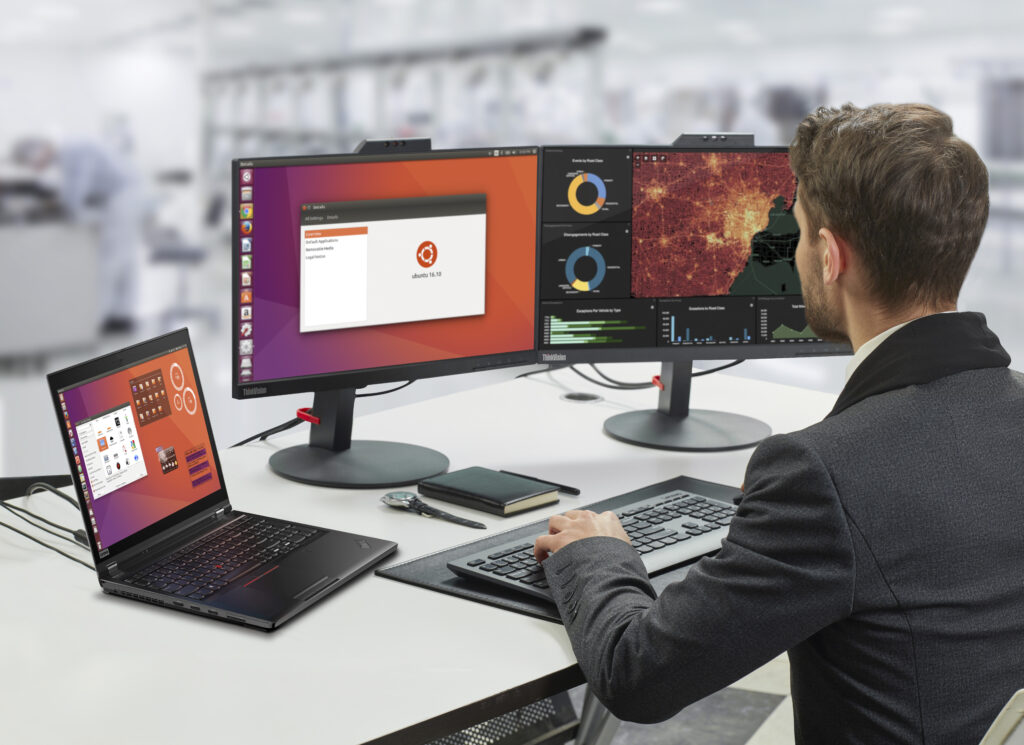
Some models are equipped with 12 DIMM sockets for the fastest possible response. Portable, yet powerful computers combine performance and high processing speed. Such devices are capable of optimizing a wide variety of processes.

Lenovo has made a significant update to the ThinkPad family of full-size notebooks this year. The new products have improved many characteristics, including the cooling system. A new model has also appeared - Lenovo ThinkPad P15v, a more compact and affordable alternative to the ThinkPad P15.

For the first time in eight years, global shipments of desktops, laptops and workstations grew 2.7% in 2019, according to Canalys. Lenovo, Dell and HP own 2/3 of this market. In terms of shipments for the year, Lenovo leads with 64.8 million devices, which is 8.6% more than in the previous year. Lenovo has shipped 62.9 million PCs, according to Gartner, with an annual growth rate of 8.1%.
For Linux fans
Developers and data scientists are increasingly turning to Linux. This operating system attracts with its stability, increased security, simpler management and administration. Plus, it saves you thousands of dollars on license purchases.

According to polls, Linux is the preferred platform for developers
Last summer, Lenovo introduced certified PCs with a pre-installed operating system Canonical Ubuntu LTS. The company now offers a full line of 27 devices running Ubuntu. These are 13 ThinkStation and ThinkPad P series workstations, as well as 14 ThinkPad T, X, X1 series notebooks with Ubuntu 20.04 LTS and 18.04.

Ubuntu 20.04, codenamed Focal Fossa
Ubuntu Long Term Support (LTS) editions are widespread and are used on computers ranging from home desktops to mission-critical cloud servers. Therefore, special attention is paid to stability, predictability and reliability.
It was important for Lenovo to provide Linux-ready devices out of the box so that such systems are available to everyone. They increase the availability of open source applications, libraries and tools, making the developer's work more productive. Eliminates the often cumbersome Linux boot process that not every user can handle. Now communities of programmers, engineers, artificial intelligence specialists and other professionals have a wider choice of devices.
For workstations preinstalled with an OEM version of Ubuntu, Lenovo provides end-to-end Internet and telephone support. This will help resolve any issues related to the functioning of the platform.
The extension includes the following Lenovo ThinkPad and ThinkStation devices:
- ThinkPad T14 (Intel and AMD)
- ThinkPad T14s (Intel and AMD)
- ThinkPad T15p
- ThinkPad T15
- ThinkPad X13 (Intel and AMD)
- ThinkPad X13 Yoga
- ThinkPad X1 Extreme Gen 3
- ThinkPad X1 Carbon Gen 8
- ThinkPad X1 Yoga Gen 5
- ThinkPad L14
- ThinkPad L15
- ThinkPad P15s
- ThinkPad P15v
- ThinkPad P15
- ThinkPad P17
- ThinkPad P14s
- ThinkPad P1 Gen 3
- ThinkStation P340
- ThinkStation P340 Tiny
- ThinkStation P520c
- ThinkStation P520
- ThinkStation P720
- ThinkStation P920
- ThinkStation P620
As you can see, the list is quite extensive. Why exactly Ubuntu, and not some other of the many versions of Linux?
Choosing Ubuntu
Industry experts have cited several reasons for using Ubuntu as your primary system. It is perhaps the most popular Linux distribution with over 20 million users, abundant documentation, high stability, extensive hardware support, availability of programs and libraries, and extremely simple installation.
Ubuntu developers initially focused on ordinary users. They wanted to create a convenient distribution with regular updates, and they did it: Ubuntu allows you to manage the system without resorting to the command line.
Detailed documentation, including in Russian, reveals almost all aspects of the OS and accelerates learning. Due to the huge number of users, on the Internet you can easily find the answer to almost any question - for example, on the askubuntu.com website or numerous Russian-language forums.

Specialists working in software development, systems administration, media and entertainment, data analysis and processing, IT engineering, artificial intelligence - all of them have access to the widest range of industry-specific software, frameworks and tools that improve workflows.
LTS versions of Ubuntu with Long Term Support are released every two years. Drivers are built into the kernel of the operating system or are supplied as separate modules that are plugged in at boot. Ubuntu OS supports both a minimal installation with the most necessary utilities and a browser, and a full installation with additional applications and packages. With each new version of the OS, installation becomes easier and more intuitive.
A huge number of programs have been developed and distributed for free for Linux: the necessary software can be found for any user request. And almost every Linux application has a package for Ubuntu. Installation is carried out through the convenient Synaptic manager, and LiveCD mode allows you to boot from CD or flash drive. Initially, the system includes a set of necessary programs for working with documents and the Internet. In short, Ubuntu is a good free alternative to Microsoft Windows.
Thanks to modularity, the user can change the structure and components of the operating system. Ubuntu comes with a Gnome environment by default, but you can use, for example, Kubuntu (KDE), Lubuntu (LXDE), Ubuntu MATE, or others. The long-term version receives security and kernel updates for five years. The system is constantly being improved thanks to the developments of Canonical.
Not just Ubuntu
In addition to Ubuntu LTS, the entire Lenovo workstation family will be certified for Red Hat Enterprise Linux, a reliable, easy-to-use and powerful operating system. It is tuned for maximum performance in graphics, animation rendering, and scientific computing applications. Red Hat Enterprise Linux offers enterprise-grade support and high stability.
Before migrating computers to Ubuntu, Lenovo released a line of ThinkPad laptops with Fedora 32 Workstation Linux pre-installed. Fedora is a fork of the Red Hat Enterprise Linux distribution. This series includes ThinkPad P53 Mobile Workstations (July 2019), ThinkPad P1 Gen 2 (September 2019), and ThinkPad X1 Gen 8 Laptop (January 2020). Fedora 33 is currently under development, but no release date has been set yet.

Lenovo ThinkPad X1 Carbon Gen 8 Laptop: Now with Fedora Distribution
Many users preferred to work with Linux on Lenovo hardware, but previously had to install the operating system themselves. This process could be labor intensive and time consuming. Lenovo enhances the user experience by offering solutions preinstalled with Fedora 32. Customers can be confident that their Linux devices are fully supported by the manufacturer and will work without any additional effort on their part.

Lenovo's new ThinkPad P53 mobile workstation with Fedora will work with Linux kernel developers to continue to run the brand's computers on all modern Linux distributions.